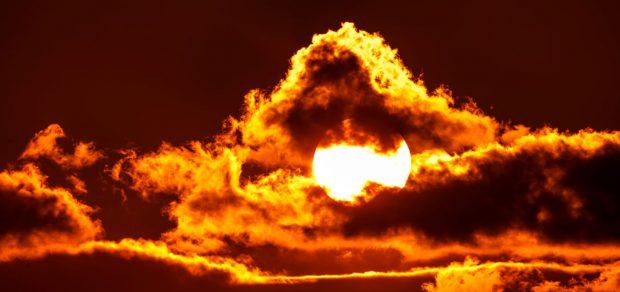Temperatures across the world are soaring as a heatwave takes over Europe, North America, and parts of Asia. The recent heatwave could break heat records, with governments across the globe sending out health warnings and preparing for evacuations.
The Heat Felt Across The World
According to the UN’s World Meteorological Organization, the beginning of this month saw the hottest week on record globally. This was an indicator of what was to come, especially because forecasters had predicted a much hotter summer. After all, El Niño—a climate pattern associated with warmer temperatures—returned for the first time in four years.
Speaking to Al Jazeera, environmentalist Anjal Prakash pointed to global warming as the main precursor to the rising global temperatures,
“As we put more and more carbon in the world’s atmosphere, the Earth’s temperature has warmed by about 1.16 degrees since the pre-industrial age. The carbon dioxide that builds up in the atmosphere … traps heat, leading to what is also known as the greenhouse gas effect – the Earth acts like a greenhouse where heat gets entrapped inside.” Prakash explained.
This phenomenon has led to record-breaking temperatures felt across the following countries:
- In Greece, temperatures in Athens reached 103 degrees on Saturday. Officials were also forced to close access to its Acropolis monument after temperatures were as high as 104 degrees.
- In Cyprus, the Department of Meteorology in Cyprus predicted temperatures as high as 110 degrees for Saturday.
- In Italy, with temperatures expected to reach 104 degrees this weekend, the Health Ministry issued red alerts for many cities, including Rome, Florence, and Bologna.
- The European Space Agency predicted that temperatures this weekend in Sicily and Sardinia could surpass the continent’s previous record of almost 120 degrees, recorded in Sicily in August 2021.
- The German Weather Service has issued heat warnings for about half the country, including Berlin and Munich.
- In the United States, the National Weather Service believes Death Valley’s Furnace Creek, the hottest place on Earth, could reach 131 degrees—a world record—on Sunday.
- Parts of Arizona have seen 110-degree temperatures every day this month.
- A heat dome is when a ridge of high pressure builds over an area and doesn’t move for up to a week or more. According to experts, this heat dome is expected to intensify and reach peak strength over parts of the Western United States, with the National Weather Service in Phoenix calling it “one of the strongest high-pressure systems this region has ever seen.”
- In China, a remote town in the country’s arid northwest, Sanbao, registered a national record of 126F.
How is the heatwave affecting longevity?
“Make no mistake about it: This heat is deadly, and being in it for long periods of time is deadly.” – Dr. Matthew Levy, Johns Hopkins University School of Medicine
Phoenix has already reported 12 heat-related deaths through mid-June. There are also 40 more open cases where heat is being investigated as a factor. Additionally, in Texas, more than a dozen heat-related deaths have been recorded so far this year.
So how exactly does heat impact your health?
According to Dr. Levy, extreme temperatures trigger heat illness in 20 to 30 minutes when individuals are doing strenuous work outdoors. Acting as a “perfect storm”, the heat overloads the body until it eventually short-circuits and then shuts down. Dr. Levy adds that the time frame could be shorter for more vulnerable groups, like the elderly and those with preexisting health conditions.
During a heat illness, people may experience symptoms such as confusion, dizziness, fatigue, headaches, muscle cramps, and vomiting. If not immediately addressed, you may experience heatstroke, with your body temperature hitting above 104F.
Once this happens, you are likely to experience hot, dry skin, a rapid heartbeat, confusion, slurred speech, seizures, and even loss of consciousness. A delay in immediate medical attention risks permanent damage to vital organs as well as death.
In addition to heat illness, a heatwave also increases the risk of premature aging and even skin cancer.

A heatwave can also impact your mental health by increasing your risk of suicide and worsening symptoms for those living with mental health conditions, particularly depression, anxiety, and bipolar disorder.
A heatwave can also have disastrous environmental effects. For instance, the marine heat off of the Gulf of Mexico is pushing water temperatures to 90 degrees, posing severe risks to coral reefs and other marine life.
Surviving the heatwave
To stay safe during this heatwave, we advise the following:
- Stay hydrated
- Pause on outdoor exercise
- Wear natural fibers, loose-fitting, breathable, and lightly-colored clothing that can reflect the heat
- Plan your car trips for cooler hours during the day
- Never ever leave children or pets inside a parked vehicle in the sun
- Walking the streets with a damp cloth on the back of your neck
- At home, keep the blinds down low and the windows open
- If it’s too hot for you to place your hand on the road for longer than five seconds, then it’s too hot for you to be taking your pet for a walk
- Watch for signs of heat stroke or heat exhaustion
- Check on relatives and neighbors, especially older people who live alone
- Avoid coffee and alcohol as they are dehydrating
Extreme weather is a global crisis
It’s not only the heat that we should be worried about, as other parts of the world are facing severe weather.
Per the Weather Service, severe storms and bouts of heavy rain are to occur from the Nation’s Heartland to the Ohio Valley and Northeast through Tuesday. Asia is also struggling with extreme weather, with China battling heavy rains and monsoon rains, reportedly killing at least 90 people in northern India.
Additionally, in Johannesburg, South Africa, residents experienced snow for the first time in more than a decade, as its last recorded snowfall was in August 2012.
How can we stop a global weather crisis?
Globally, extreme weather is becoming a cause for concern, but if we act now, we can protect ourselves and the planet.
Here are 5 personal habits we’ve curated that you can use today to help.
- Put pressure on governments and businesses to reduce emissions. Also, make sure they support political parties that have clear net zero policies and strategies.
- Eat a planet-friendly diet, making sure to eat more vegetables and fruits.
- Reduce consumption of red meat, as beef production does increase global warming due to the gases they omit.
- Reduce your use of single-use plastic and become more energy conscious at home.
- Avoid fast fashion and instead, opt for thrift shopping.



![women [longevity live]](https://longevitylive.com/wp-content/uploads/2020/01/photo-of-women-walking-down-the-street-1116984-100x100.jpg)










